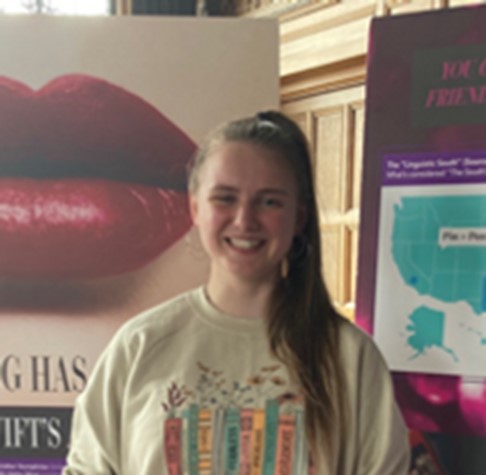A Degree in English Language “Opens Many Doors”! - Our English Lecturers Provide Insights from Our Graduates
English Language lecturers Dr Jo Close and Dr Helen West talk with our graduates on a panel about their experiences of the University of Chester and where their degree with us has taken them.

Where can a degree in English lead you? University of Chester English Language alumni students have some answers to that question. Speaking at the UoC Creative Futures English Alumni Panel, they offered outstanding tips on what you can do with your degree and why your degree is important, which of the skills you are gathering now will be useful when you graduate, the dos and don’ts of writing CVs and applying for jobs, and what to expect when applying. Here is what they had to say…
The panel:
Kate Green graduated in 2017 with a degree in English Language. She is now a Content Marketing Executive at Guy’s and St Thomas’ Specialist Care in London.

Vicky Tams graduated in 2017 with a degree in English Language. Vicky worked as an au pair in Toronto Canada for two years and now works in secondary education in the UK.

Esther Humphries graduated in 2023 with a degree in English Language and has held posts as a Speech and Language Therapy assistant in Special Educational Needs schools. She continues to work as a professional researcher on the Swift Accent Shift Project, which is based on her undergraduate dissertation. 
Emily Boland graduated in 2017 with a degree in English Language. She originally wanted to work in fashion but found, once she entered the profession, it was not for her. She is now a Performance Marketing Creative Manager in London.

How did your degree enable you to get a job?
Unanimously, the panel stated that having any degree was an essential requirement for applying for their jobs.
Kate started in another role when her current post became available internally. Her current post required excellent communication skills, and her company looked for people who had a degree in English.
Emily notes that talking about her dissertation, which she thoroughly enjoyed, helped her to demonstrate that she has academic interests during interviews. Leading on from this, panel members agreed that there is a broad range of skills that are acquired in English Language, which have proven invaluable to their work:
- Independent work (i.e., dissertation, assessments and projects)
- Modules that involved language in the media have really helped with careers in marketing and learning to write for, and communicate with, different audiences.
- Presentations and assessments helped with communication skills and performing in interviews.
- Analysis and research skills.
They didn’t fully realise how useful these skills would be until they entered their careers.
What impact did your degree have in your approach to your current career?
Vicky and Emily took some time to study abroad at the end of second year in Germany, and they reported that this experience helped them to become more independent. They said that “the university is a massive support, but once you move outside of this, you need to be more independent to get by”. This experience encouraged Vicky to live abroad after her degree, and Emily reports that this better prepared her to live in a large city like London, which she absolutely loves.
All the panel agreed that experiences such as working and volunteering during their degree prepared them for work afterwards, not just in terms of the skills and experience that they gathered from doing travel and work, but because employers recognised that they were able to manage their time between their degree and working, and that they had gathered work experience.
Could you tell us what the most important thing is you learnt in your degree that supports your job now?
Kate says that she “fell into her job accidentally as English opens so many doors”. For Kate, research and writing were the most important. Kate’s job in one of the largest medical providers in the country, requires her to do a lot of independent research as well as interviewing world-renowned medical consultants who are trialling innovative medicines and medical procedures. To carry out her role, she found many parallels with her English degree:
- the research skills she gathered such as learning what was and what wasn’t such a reliable source
- the interview skills she developed on her degree have enabled her to effectively interview the medical professionals
- and the writing skills that she developed have proven invaluable.
She learnt to write both technical and persuasive texts during her degree and now she can write for different audiences; from interview and research reports, to persuasive texts, to encourage consumers to take-up the innovative procedures on offer. She said that lecturers’ careful feedback on her writing skills during assessments, as well as learning how the English language works and is structured, has enabled her to be a highly effective writer.
Vicky and Emily note that the ability to meet multiple deadlines is their essential take-away from their degree, as being super-organised is a key skill in project management (Emily) and working in a secondary school (Vicky).
Esther’s essential skill is teamwork. She notes that being able to communicate ideas with her collaborators in research is what makes the research flow and makes it even more exciting.
Do you have any advice for our current students who may wish to do something similar to what you are doing now?
Vicky recommends travel. She says “you finish uni at 21 and you can be a teacher by the age of 22. You need to be able to hold your ground dealing with teenagers (and parents). Take your time to figure out what you want to do and don’t rush after uni. It’s ok to not know what you want to do”.
Emily agrees that taking your time is key. “You can restart your career if you get it wrong but take the time to think about what you want to do and how you can best use your skills. You spend most of your time at work, so you need to get it right”.
Kate: “There’s no shame in having a placeholder job while you figure out what you want to do. Working for smaller businesses, rather than going straight for a big company, is a good way to gain experience and get a foot in the door”.
Esther: “Try to do what you enjoy doing. I’ve had some challenging roles, but I’ve been able to reflect on these experiences and pick out the parts that I’ve really enjoyed and think about where I want to go from this experience”.
Read the full blog post on the C.E.L.L.M.A.T.E.S magazine that students and staff write together and discover more about where an English Language degree at Chester can take you on our course page.
Written by Dr Helen West and Dr Harry Parkin